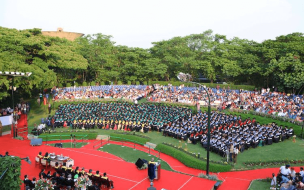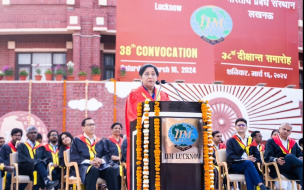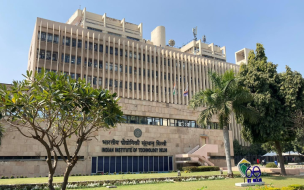BusinessBecause sought insights from b-school directors, deans, and other experts regarding the changes set to impact their institutions in 2024.
Here are their 9 predictions for the year ahead.
1. Business schools will future-proof managers with ‘flexpertise’
“Young managers are going to be required to solve complex problems compounded by climate change, terrorism, and other foreseen and unforeseen calamities.
“Hence, management graduates will require a broad range of thinking skills and awareness of the world.
“They should be able to extract actionable insight from a sea of data in an uncertain environment. Therefore, the most important managerial skill required will be ‘flexpertise’.
“Learning will move from painful rote memorization to the quest for creativity, problem-solving ability, higher-order thinking, and the sheer joy of discovery.”
Professor Debashis Chatterjee, director, IIM Kozhikode
2. Programs will focus on real-world exposure, practicality, and innovation
“This year, Indian b-schools are poised to revolutionize education by emphasizing practical skills crucial for an ever-evolving industry landscape. Embracing sustainability and entrepreneurship—especially after the COVID era—institutions will integrate AI-driven disciplines into traditional subjects.
“Electives have already expanded to encompass AI integration, digital marketing, and sustainable practices, aligning with industry requirements. Recruiters are valuing hands-on expertise alongside academic prowess and [we see] students actively pursue experiential learning, craving real-world exposure and the acumen to foster startups.”
Himanshu Rai, director, IIM Indore
3. B-school coursework will have to be industry-relevant
“The speed of technology-driven transformation is increasing, resulting in a faster pace of change in the global labor market. Thus, b-schools should ensure that coursework remains relevant and up to date for industry.
“The focus should be on preparing professionals in cutting-edge areas that are fast gaining prominence, such as AI, big data analysis, machine learning, etc.
“In parallel to this, b-schools should also play an important role in growing students’ awareness of sustainability and climate change.”
Prof Kunal K Ganguly, dean (development), IIM Kashipur
4. AI will help to improve the student experience
“The use of Chat GPT, AI, and [other] such new technology for assessment and evaluation by faculty will expand beyond catching plagiarism.
“In 2023, [AI tools] were being used by students for completion of projects, assignments, submissions, and such.
“[This year], we will see the use of AI and other tools to capture student feedback, attentiveness, interest in the classroom, and emotions.”
Prof Ram Kumar Kakani, director, IIM Raipur
5. Cutting-edge technology will globalize the classroom and personalize education
“The integration of cutting-edge technology will reshape curriculums and courses into a new era of education. For example, despite geographical constraints, virtual reality classrooms will enable immersive learning experiences for students across the globe.
“AI will take center stage, personalizing educational journeys to individual needs. Blockchain technology will secure academic credentials, ensuring integrity in a digital age.
“Another example of [evolving] technology is real-time data analytics that will empower educators to fine-tune teaching methods dynamically. In short, knowledge centers will evolve into smart ecosystems, leveraging Internet of Things (IoT) for streamlined operations.”
Dr Arvind Sahay, director, MDI Gurgaon
6. Schools will beat recruitment challenges by focusing on delivering 21st-century skills
“Business education has to be deeply aligned to the dynamism of industry for it to be relevant and practical. While b-schools are incorporating new-age practices within their curricula to make learning industry-oriented, the [recruitment] signs from the business world are not very encouraging and the trend is likely to spill over in 2024.
“Studies indicate that about 1.55 lakh IT and engineering graduates are likely to be hired in 2023-24, down from 2.30 lakh in the previous year. The effect may get further aggravated in an election year during which public spending is likely to go down in the initial months.
“Add to this scenario the challenges in the global supply chains due to the ongoing geo-political conflicts and crises. B-schools have to anticipate these disruptions and align their education delivery to make students future-ready.
“For this, there has to be a distinctive focus on developing soft skills like communication, problem-solving, critical thinking, and digital competency. […] I foresee a stronger emphasis on developing the 21st century skills in learners.”
Rajiv R. Thakur, director general, Jaipuria School of Business, Ghaziabad
7. Government-led reforms will propel education's digital revolution and support education in native languages
“In 2024, the winds of change are sweeping through the education sector, driven by overdue policy reforms. The government's visionary initiatives are steering the course toward a future marked by digitization, global collaboration, and skill-centric curricular reforms.
“Short-term goals include fostering global exchange programs, enabling credit transfers, and facilitating joint degrees with foreign institutions. The emphasis on digital integration, propelled by the government's push for digital literacy and smartphone accessibility, is set to revolutionize education.
“A spotlight on vernacular technical education is expected, acknowledging that the Gross Enrollment Ratio hinges on delivering higher education in native languages. Foreseeing this need, major government initiatives are anticipated to fund vernacular content creation.”
Dr Suresh Ramanathan, dean, Great Lakes Institute of Management, Chennai
8. Business schools will prep more students for careers in analytics and blockchain and emphasize experiential learning
“I think the biggest change that business schools will face in 2024 will relate to an increased focus on analytics.
“Though there is also a risk that a lot of analytics work might be taken over by AI in the future, that’s a long-term future. In the short run, the focus on analytics will be very high, and the focus on other technologies like blockchain will also increase.
“At the same time, the business school has to increasingly focus on experiential learning in the workplace with respect to all functional areas. They have to increase their focus on live projects and fieldwork for learning the basic tools of market research so that they can investigate the current problems of the industry and find solutions to them.”
Dr Sanjay Modi, pro vice-chancellor, Lovely Professional University (LPU)
9. Faculty will help students adapt to technological change by nurturing critical thinking
“In 2024, faculty roles need to evolve into those of adaptive learning facilitators, nurturing critical thinking and creativity. This will help in utilizing technology, that in turn will serve as a catalyst, bridging accessibility gaps in education delivery.
“Driven by youth beliefs in innovative education, programmes can be tilted towards interdisciplinary studies, in line with the National Education Policy (NEP), fostering a culture that empowers students to navigate the professional realm adeptly—as and when they want.”
Himanshu Rai, director, IIM Indore
Image © Telugu abbayi on Wikipedia Commons, reproduced under this license







